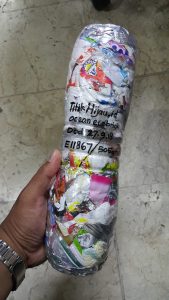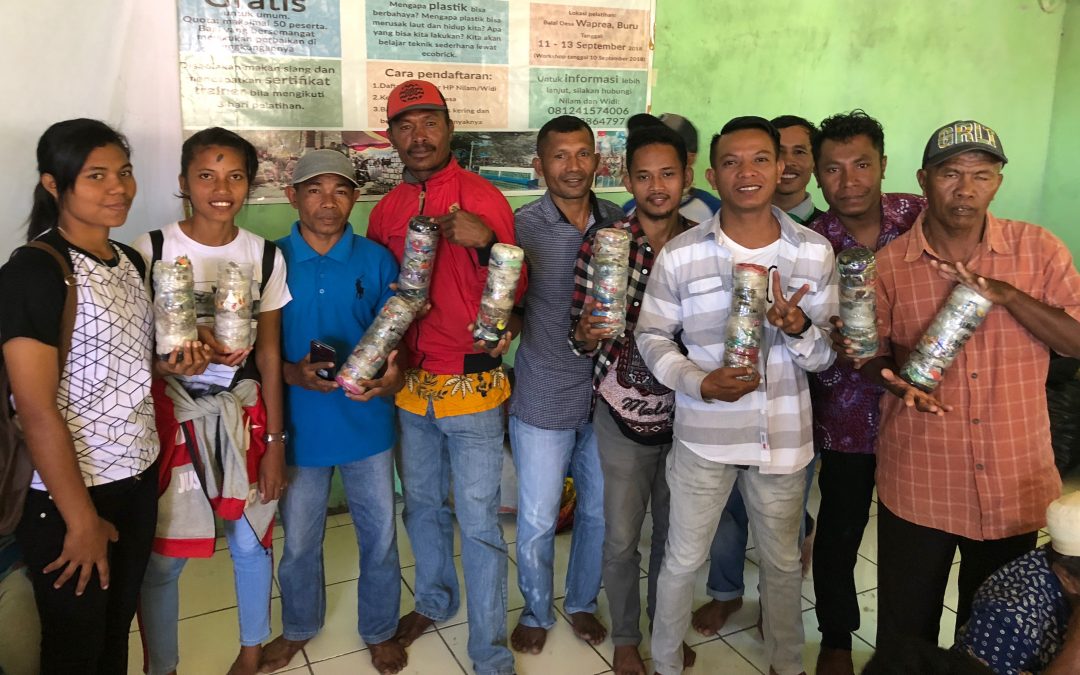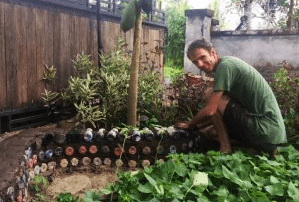Around the world, folks have been cleaning things up. Thousands of clean-ups have picked up thousands of tons of plastic. Hurray! I am glad. After all, plastic causes all sorts of problems when it is loose in the environment. However…
What now?
First, what now to do with all the ‘trash’ that has been picked up? Right now it is sitting in garbage bags that, most likely, will be brought to a dump site. But how different is that ‘dump site’ or ‘land fill’ from the field, shore, or forest where the plastic was picked up? After all, it was only a few decades ago that the land fill was itself a field or forest, shore or river ravine.

An Ocean Ecobrick is one way to transform ocean plastic into a practical and re-usable building block.
Second, now that the clean-up day is over, what now to do?
After all, we’re all involved in the consumption (and thus the production) of the very plastics that we were picking up. And we had better get our personal participation sorted soon: despite all the PR campaigns of companies reducing their packaging and talk of banning straws, Colossal funding in manufacturing plants by fossil fuel companies will increase plastic production by 40%, risking permanent pollution of the earth. Lots more plastic is on its way.
But, I am glad we’re talking! I am glad that these issues are out of the dark and we are talking about plastic.
Plastic, as a material is not evil — it is made from atoms and molecules like everything else. Plastic as our creation, like any technology, is a reflection of our civilizational stage of consciousness development. Looking in this mirror, we can see our pubescent quirks. We have much to learn, and big choices to make. We can see that we’re at a tremendous moment of making choices about who we want to be.
That said, I believe that this plastic stage is a grand opportunity to choose who we want to be on Planet Earth — both individually and collectively.
I observe that each piece of plastic, each straw, each acetate-filter-cigarette-butt is a grand opportunity! Global plastic clean-ups, corporate lobbying and banning plastic straws and plastic bags are all important endeavours. Vastly more so, is the personal, existential, moment-by-moment choice that you and I have with each plastic bag, cigarette, razor, and straw that passes through our moments. When we throw away, recycle, or in any way hand off our plastic, we perpetuate the very industrial systems that are at the root of the waste and pollution problem.
Or we can keep our plastic. We can claim it, and we can take responsibility for each piece, count it, clean it, and keep it out of the old and failing global industrial systems and put it to use locally.
In my home, no plastic departs!
Every month, my partner and I weigh our net consumed plastic down to the gram. Our goal is to mindfully track our consumption, and steadily reduce each month what we consume. The plastic that we do consume, and the plastic we gather from our neighbours we pack into a bottle to make an ecobrick. We have used ecobricks to build our garden, our table and chairs. We log our ecobricks each month on the GoBrik.com app. We review the ecobricks of others around the world and earn Brikcoins for each gram of plastic removed from the biosphere. We use these Brikcoins to pay our friends and neighbours for food, services and other things.
Indeed, plastic is something to pick up. However, it is time to reconsider what we do with it afterwards. Plastic is precious, both in its absence from the environment, and in what we can do with it next.
Along this line, I am proud to release this how-to video on the making of an Ocean Ecobrick (in Indonesian Ecobrick Samudra). This is my open source (cc-by-sa) that i am proud to say fully embodies regenerative, cradle-to-cradle, mandalic principles to allow anyone anywhere to transform plastic (especially the plastic that we’ve picked up on beaches!) to be transformed into a practical and re-usable building block.
It’s in this way, today and tomorrow, and most importantly… right now… we can choose the sure and steady transition from plastic to ever greener harmony with the cycles of life in our homes, companies, and communities.


